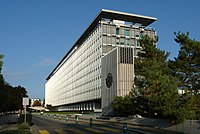
Photo from wikipedia
The aim of the study is to investigate the effect of policy incentives on residents' willingness to use community health centres for initial diagnosis. A cross-sectional survey with specific multiple… Click to show full abstract
The aim of the study is to investigate the effect of policy incentives on residents' willingness to use community health centres for initial diagnosis. A cross-sectional survey with specific multiple price-list experiments was conducted in Guizhou, China. We were able to use in-depth individual interviews with a total of 422 participants. Our results showed that both financial and non-financial policy incentives can facilitate the utilisation of the community health centres. Approximately 60% of the respondents reported an increase in their willingness to use community health centres after the presentation of the financial policy, whereas 50% of respondents expressed an increase in their willingness to use community health centres with the non-financial policy. However, to some specific subgroups, such as residents with low trust, residents without chronic disease, residents with less healthcare visits and risk-averters, the impact of policy incentives were limited. The policy incentives are useful tools to attract more visitors to community health centres for initial diagnosis; however, their incentive effects vary in different subgroups. Thus, to change patients' perceptions regarding healthcare provider choice for initial diagnosis, policymakers should consider the heterogeneous responses of patients to policy incentives and focus their efforts on key cohorts.
Journal Title: Australian journal of primary health
Year Published: 2022
Link to full text (if available)
Share on Social Media: Sign Up to like & get
recommendations!